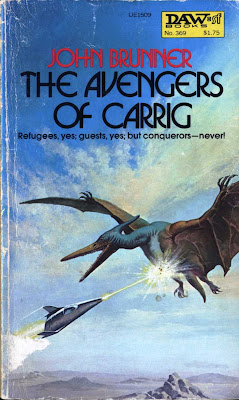Book Review: 'The Presence' by Rodgers Clemens
4 / 5 Stars
With the advent of October and, in due course, Halloween, here at the PorPor Books Blog, we will be showcasing a number of horror-related books and graphics.
‘Rodgers Clemens’ is apparently a pseudonym used by Roger Lovin, who in 1974 published wrote a well-received guide to long-distance motorcycling titled ‘The Complete Motorcycle Nomad’.
Judging by some of the reviews at amazon.com for ‘Complete’, as well as a Google search under his name, Lovin got into plenty of trouble for a variety of criminal acts (?!) in the early 1980s, and is deceased.
‘The Presence’ (253 pp.) was issued by Fawcett in 1977; the cover illustration is by Don Ivan Punchatz.
Punchatz's illustration is more appropriate for a New Age-themed paperback about the healing power of crystals or some such drivel, and probably will deter some would-be readers. But in fact, if you look past the awkward cover art, ‘Presence’ is an interesting horror novel.
It starts as a derivative of the classic Joseph Payne Brennan novelette ‘Slime’, and dallies for its first half in traditional ‘Monsters On the Loose’ comic book action. However, the second half of the novel expands in scope; the threat becomes more encompassing, and the nature of the enemy undergoes some significant alterations.
Clemens’s writing style is lucid and direct, and while he does engage in some philosophical indulgences, he does not do so to such excess that it sends the main storyline off on a tangent.
The cast of characters includes scheming politicians, a beautiful news reporter, an eccentric scientist who is the Only One who can Save the Earth, and that staple of 70s literary dramas, the power-mad military officer.
The pace moves along at a good clip, devoid of the ponderous quality often found in other 70s horror fictions, where mood and atmosphere dictated the exigencies of the plot, often with underwhelming results.
I suspect dedicated Splatterpunks would have taken author Clemens’s premise and amped up the gore quotient quite a bit, and that would have made the book more rewarding in some ways. But ‘The Presence’ remains worth searching out for those interested in a monster story that interjects bit more imagination into the usual formula.















































































